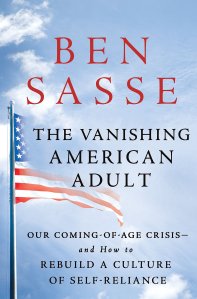 Senator Ben Sasse’s The Vanishing American Adult is part blueprint to reverse the juvenalization of American society and part autobiography. Drawing upon authors such as Christian Smith, (see here for more on emerging adulthood), Jeffrey Arnett, and his own experience as a college president, Sasse explores the problems of emerging adults, and how to help them become more self-reliant. His case is laid out in in several chapters entitled: Flee Age Segregation, Embrace Work Pain, Travel to See, Consume Less, and Build a Bookshelf.
Senator Ben Sasse’s The Vanishing American Adult is part blueprint to reverse the juvenalization of American society and part autobiography. Drawing upon authors such as Christian Smith, (see here for more on emerging adulthood), Jeffrey Arnett, and his own experience as a college president, Sasse explores the problems of emerging adults, and how to help them become more self-reliant. His case is laid out in in several chapters entitled: Flee Age Segregation, Embrace Work Pain, Travel to See, Consume Less, and Build a Bookshelf.
While not a book about evangelism, church planting, or collegiate ministry, Senator Sasse’s book still touches on a huge problem facing the church: a rapidly growing illiterate American society which does not understand civic virtue, hard work, and the gift of liberty. Drawing on research Senator Sasse points out numerous troubling points:
- Declining readership
- Safe spaces at colleges to avoid troubling topics
- Lack of understanding on the make up of government
- Increase in the time spent on social media
- Mass consumerism
- A schooled elite with no work experience
According to Sasse, who has a Ph.D. in history, the United States has abandoned its traditional notions of close family ties in both church, education, and work, to more and more age-segregated groups. This segregation coupled with a secularized public education system and a 24-7 internet black hole is leaving Millennials and Generation Z to fend for themselves with terrible results.
One of the ways to turn this situation around, according to Sasse, is to integrate children back into the family. This means families taking more control of the education of their children, while also including them in adult society. This will be a slow process. It will require families to make huge investments in changing lifestyles. The ubiquitous internet and first cousin consumerism must first be tackled by parents so as to model it to their children. We have to ponder, how much are parents willing to change.
Quoting Mark Twain that “I never let school get in the way of my education”, Sasse makes a plea for adults to bring their kids more and more into their world to see what adult work is like. Rather than shield children from work and its reality, we need to be helping them navigate those waters earlier. This means supplementing their educations in highly important but non-school ways such as travel, working with their hands, responsibility taken earlier rather than later, and wrestling with the ideas of great books.
So why should pastors, youth ministers, parents, and collegiate ministers read Sasse’s book? Because the work we have to do as Christians is not only evangelism and church planting. To help foster a functioning society, we are going to have to educate, and mature, a society that is deeply broken in its spirituality, character, and thinking. As quoted by Rod Dreher in his book, The Benedict Option, professor Michael Hamby states: “Education has to be at the core of Christian survival—as it always was.” According to Hamby, there must be a quest for what is true and beautiful. The church must be concerned with guiding the next generation on such a quest.
In some ways this book is too late for college students (though anyone can start wrestling with its ideas). It fits best to teach families and the church how to begin thinking about systematic reform for young adults before they get to college. And for those who are passionate about future college students, I would argue that it is up to collegiate workers to help address the challenge of this book.
Here are a few suggestions to use this book:
- Create your own list of 60 great books and start reading them
- Find out what your students are reading and see where they need help filling in the cracks
- Create summer reading lists for college students
- Create a theology of work and teach it early
- Share the importance of an understanding of global Christianity
- Include this book as a resource for church leaders who are preparing youth before they get to college
- Use it as a reference for parents who are asking about preparing their children for college
- Refer it to pastors in your personal circle of friends or colleagues
Finally, if you are interested in creating a look list, don’t’ just skip to the back and see what Senator Sasse put on his list of 60 books. Instead, take some time and struggle to come up with your own list. But don’t stop there. Set up a shelf, put your books on it and invite your family, church, or collegiate group to start reading.
To hear Rod Dreher on the importance of education click here
Good stuff! Do you have a 60 great books list yet?
LikeLike
About half way, so hard to narrow it down. But the interesting thing is deciding on the categories. Sasse recommends 5 books in 12 categories. If you go with that template, the categories are interesting to ponder as well. Lots of room there for different categories. I was tracking with the first 5-6 categories, then he went in some interesting directions. Of course you could say 6 books in 10 categories, etc. Have fun working on it, and let us know where you land!
LikeLike
Pingback: Lost in Transition Part 2: Mass Consumerism | Campus Parade
Pingback: Lost in Transition | Campus Parade
Pingback: Your 2018 Reading List | Campus Parade